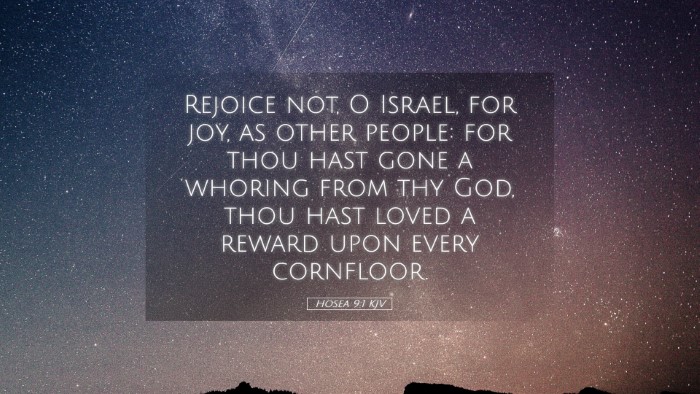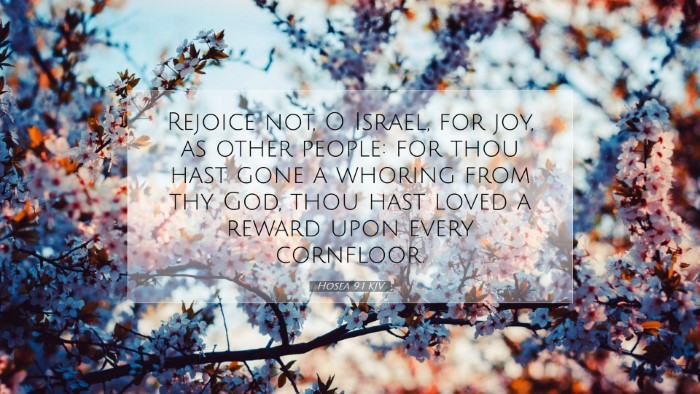Old Testament
Genesis Exodus Leviticus Numbers Deuteronomy Joshua Judges Ruth 1 Samuel 2 Samuel 1 Kings 2 Kings 1 Chronicles 2 Chronicles Ezra Nehemiah Esther Job Psalms Proverbs Ecclesiastes Song of Solomon Isaiah Jeremiah Lamentations Ezekiel Daniel Hosea Joel Amos Obadiah Jonah Micah Nahum Habakkuk Zephaniah Haggai Zechariah MalachiHosea 9:1
Hosea 9:1 KJV
Rejoice not, O Israel, for joy, as other people: for thou hast gone a whoring from thy God, thou hast loved a reward upon every cornfloor.
Hosea 9:1 Bible Commentary
Commentary on Hosea 9:1
The verse Hosea 9:1 states: "Rejoice not, O Israel, for joy, as other people: for thou hast gone a whoring from thy God, thou hast loved a reward upon every cornfloor.". This verse serves as a cautionary admonition to the people of Israel in the context of their unfaithfulness to God.
Introduction
Hosea's prophetic message is characterized by his personal experiences mirrored in Israel's spiritual infidelity. As a prophet, he offers poignant insights into the consequences of turning away from God. His use of vivid imagery and strong language reflects the seriousness of Israel's situation, making this verse a key element in understanding their relationship with God during Hosea's time.
Historical Context
To grasp the depth of Hosea 9:1, one must consider the historical backdrop of Israel during the 8th century BCE. The nation was ensnared in idolatry, with practices that were abhorrent in the sight of God. They indulged in rituals that were akin to spiritual prostitution, sacrificing to false gods while neglecting their covenant with the Lord.
The agricultural imagery in the latter part of the verse refers specifically to the worship of grain and fertility gods, illustrating the people’s misplaced allegiances. Matthew Henry helps us to see that these "reward upon every cornfloor" imply the people received material blessings while they disregarded spiritual fidelity.
Exegesis of the Verse
In beginning, Hosea's call to refrain from rejoicing highlights the Israelites’ condition. Albert Barnes states that their joy was misplaced, originating from a superficial understanding of blessings. Instead of celebrating the seasons of plenty as gifts from the True God, they attributed their prosperity to false idols.
The phrase "thou hast gone a whoring from thy God" underlines the gravity of their infidelity. Adam Clarke expounds on this by explaining that the term "whoring" is used symbolically, denoting the spiritual adultery that occurs when Israelawards her affection to other deities while abandoning her covenant with Yahweh.
Theological Implications
Hosea 9:1 raises critical theological truths regarding the nature of God’s relationship with His people. The bond between God and Israel is frequently compared to that of a marriage, and their idolatry disrupts this sacred covenant. The dire consequences of such relationships serve not only as a warning but as a means to highlight God’s zeal for holiness among His people.
This passage also reveals the tension between joy and disobedience. While the people may feel joy in their harvest and success, it is hollow and short-lived due to their disobedience to God. Matthew Henry articulates the idea that true joy can only stem from a right relationship with the Lord.
Practical Applications
For modern believers, Hosea 9:1 resonates as a powerful reminder to examine the objects of our affection and loyalty. Pastors and theologians can draw on this verse to instruct congregants against complacency and idolatry in contemporary forms. It encourages vigilance against any inclination to prioritize material prosperity over spiritual fidelity.
- Challenge of Idolatry: Reflecting on what takes the place of God in one's life. Just as Israel struggled with idolatry, so do many today face similar distractions.
- The Nature of True Joy: Encouraging believers to seek joy that stems from a relationship with God rather than from material gain or societal approval.
- Covenantal Faithfulness: Emphasizing the importance of remaining faithful to God's commands and the consequences of straying from His path.
Conclusion
Hosea 9:1 encapsulates the emotional and spiritual turmoil of a people caught in the throes of idolatry. The call to refrain from joy and the warning against apostasy serves as a timeless message for all generations. It implores believers to engage in self-reflection about their spiritual lives and relationships, and it directs their hearts back to God, the ultimate source of true joy, fulfillment, and purpose.


